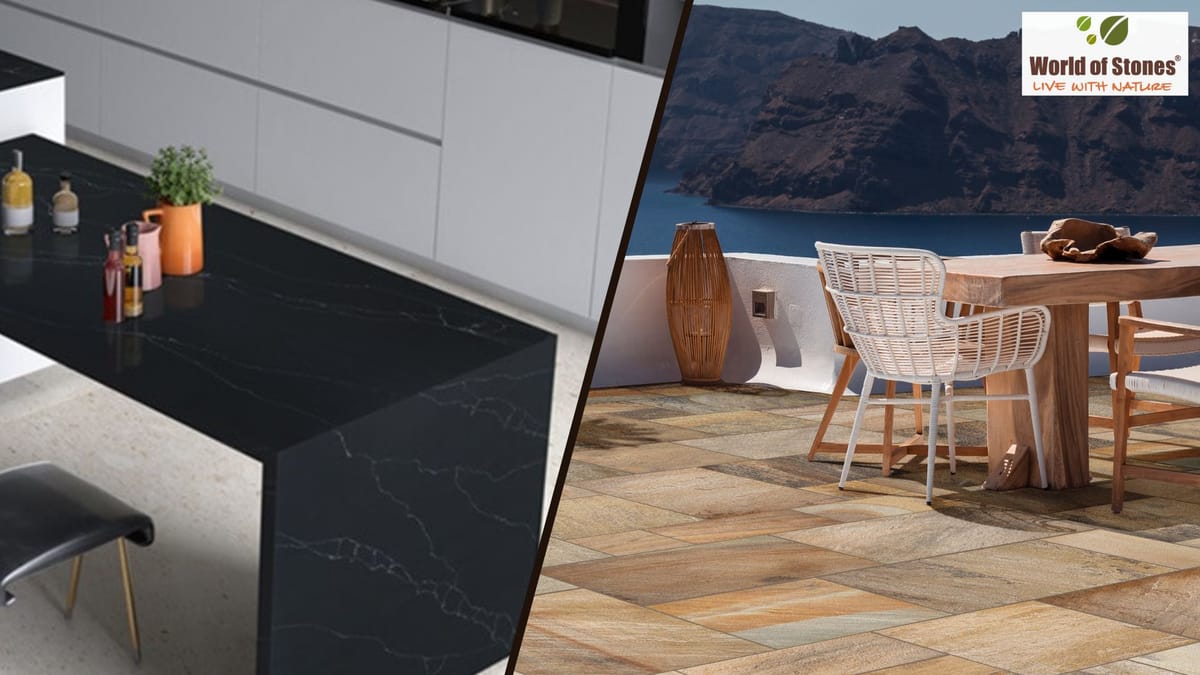Natural Stone vs. Engineered Stone: Ultimate Guide to Choosing the Best Material
Natural Stone Vs. Engineered Stone: Pros and Cons

Natural Stone Vs. Engineered Stone: Pros and Cons
When it comes to choosing the right material for your home or commercial project, natural stone and engineered stone are two of the most popular options. Each has its own unique properties, benefits, and drawbacks. This blog will delve into the pros and cons of both, helping you make an informed decision for your future project.
Natural Stone Vs Engineered Stone: Pros and Cons
Natural Stone
Natural stone is created by nature over millions of years through geological processes. Common types include marble, granite, limestone, and slate.
Pros of Natural Stone
1. Aesthetic Appeal: Natural stone is known for its unique and beautiful patterns. Each piece is distinct, adding a touch of luxury and elegance to any space.
2. Durability: Many natural stones, such as granite and marble, are incredibly durable and can last a lifetime with proper care.
3. Heat Resistance: Natural stone is resistant to heat, making it an excellent choice for kitchen countertops and fireplaces.
4. Environmental Impact: Being a natural product, stone is eco-friendly and sustainable, especially when sourced responsibly.
5. Increases Property Value: Natural stone can increase the resale value of your property due to its timeless appeal and durability.
Cons of Natural Stone
1. Cost: Natural stone can be expensive, both in terms of initial purchase and installation.
2. Maintenance: Some stones require regular sealing and maintenance to prevent staining and damage.
3. Porosity: Stones like marble and limestone are porous and can be susceptible to staining and etching from acidic substances.
4. Weight: Natural stone is heavy, which can complicate transportation and installation.
5. Variability: The unique patterns of natural stone can be a double-edged sword if consistency in appearance is desired.
Engineered Stone
Engineered stone, also known as quartz, is a man-made product composed of crushed stone bound together by an adhesive, often with added pigments and other materials.
Pros of Engineered Stone
1. Consistency: Engineered stone gives uniformity in colour and pattern, which can be advantageous for achieving a consistent design.
2. Durability: It is highly durable, resistant to scratches, and less prone to chipping compared to natural stone.
3. Non-Porous: Engineered stone is non-porous, making it resistant to staining and bacterial growth. This makes it an excellent choice for kitchen and bathroom surfaces.
4. Low Maintenance: It requires minimal maintenance compared to natural stone and does not need to be sealed.
5. Cost-Effective: Generally, engineered stone is less expensive than high-end natural stone.
Cons of Engineered Stone
1. Heat Sensitivity: Engineered stone can be damaged by high heat, so it's not ideal for areas exposed to hot pots and pans.
2. Environmental Concerns: The production of engineered stone involves synthetic resins and significant energy consumption, which can have a greater environmental impact compared to natural stone.
3. Artificial Appearance: Despite advancements, engineered stone may lack the natural look and feel of authentic stone.
4. Color Fading: Prolonged exposure to UV light can cause some engineered stones to fade over time.
5. Limited Repair Options: If damaged, engineered stone can be challenging to repair without noticeable differences.
FAQs about Natural Stone and Engineered Stone
Q: Is natural stone more durable than engineered stone?
A: Both natural and engineered stones are durable, but their durability can vary depending on the specific type of stone and its application. Granite, for example, is one of the most durable natural stones, while engineered stone like quartz is known for its scratch resistance.
Q: Can engineered stone be used outdoors?
A: Engineered stone is generally not recommended for outdoor use because prolonged exposure to UV light can cause discoloration and degradation of the resin that binds the material.
Q: How do I maintain natural stone surfaces?
A: Natural stone surfaces should be sealed regularly to prevent staining and etching. Daily cleaning with a pH-neutral cleaner is recommended to maintain their appearance.
Q: Is engineered stone more eco-friendly than natural stone?
A: While natural stone is a more eco-friendly option due to its natural origin, engineered stone manufacturing can have a higher environmental impact due to the use of synthetic resins and energy consumption.
Q: Which stone is better for a busy kitchen?
A: For a busy kitchen, engineered stone may be a better choice due to its non-porous nature, resistance to staining, and low maintenance requirements.
Q: How do I maintain engineered stone surfaces?
A: Engineered stone surfaces are relatively low maintenance. Regular cleaning with a gentle soap and warm water is typically all that's needed to keep engineered stone looking its best. Steer clear of abrasive cleaners or scrubbers, as they can scratch the surface. While engineered stone is resistant to staining, it’s still a good idea to clean up spills promptly, especially those involving acidic substances. Unlike natural stone, engineered stone does not require sealing. For tough stains, a gentle scrub with a non-abrasive cleaner is recommended.
Conclusion
By understanding the pros and cons of natural and engineered stones, you can choose the material that best fits your aesthetic preferences, functional needs, and budget. Whether you opt for the timeless beauty of natural stone or the modern convenience of engineered stone, both materials can add significant value and style to your space. Are you struggling choosing natural stone vs engineered stone for your home? Relax, you are not alone, many people search it hard to decide too. Worldofstones can help you choose. Contact us! Our Experts will suggest stone for your home.